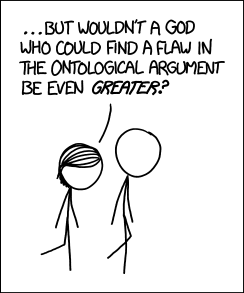 The following ontological argument attributed to Anselm is sometimes cited as a proof of God. It does not say which God, but somehow makes a quick jump to Jesus. It goes like this:
The following ontological argument attributed to Anselm is sometimes cited as a proof of God. It does not say which God, but somehow makes a quick jump to Jesus. It goes like this:- By definition, God is a being than which none greater can be imagined.
- A being that necessarily exists in reality is greater than a being that does not necessarily exist.
- Thus, by definition, if God exists as an idea in the mind but does not necessarily exist in reality, then we can imagine something that is greater than God.
- But we cannot imagine something that is greater than God.
- Thus, if God exists in the mind as an idea, then God necessarily exists in reality.
- God exists in the mind as an idea.
- Therefore, God necessarily exists in reality.
Note that 1. provides a definition of God: God is a being than which none greater can be imagined. That means, go ahead and imagine the greatest being you can. That is the one to be called God. It does not matter if someone else can imagine a greater being, only your imagination counts. You can use whatever criteria you want to define greatness. The only caveat is that if you can imagine a greater value for a criterion for another entity, then the entity you were imagining is not God.
Once you accept the premise, then the rest of the argument follows. It is a valid argument. Jesus is not proven to exist. But God as defined, is shown to exist. It is a fairly useless God though, because without knowing the criteria for greatest and his other attributes he is virtually useless. No one worships this God, as much as, say, Jesus.
No worries, because here's another ontological argument that disproves God. By Douglas Gasking, an Australian philosopher.
- The creation of the world is the most marvellous achievement imaginable.
- The merit of an achievement is the product of (a) its intrinsic quality, and (b) the ability of its creator. The greater the disability (or handicap) of the creator, the more impressive the achievement.
- The most formidable handicap for a creator would be non-existence.
- Therefore, if we suppose that the universe is the product of an existent creator we can conceive a greater being - namely, one who created everything while not existing.
- An existing God, therefore, would not be a being greater than which a greater cannot be conceived because an even more formidable and incredible creator would be a God which did not exist.
- God does not exist.
In other words, if you accept the premise that the most marvellous achievement is the creation of this entire world, then its creator is who you call God. If you can imagine a more marvellous creation, then that entity is to be called God.
To see a simple application of this argument, consider the Abrahamic God as the creator. He allegedly created the world in six days. Six days to create this world is pretty awesome. But you can already imagine a greater feat: creating the world in five days. Surely that is more awesome. Why stop there? Creating the world in 4, 3,...1 day would be even more awesome.
What would be most awesome then, is a creator who would have created the world in no time. So right away, the Abrahamic god is slayed by ontology. However, we have not disproved say, a deist god. He could have created the world in no time, so this argument would not rule him out.
Yet.
Yet.
Fear not, because Gasking's proof talks about handicaps in 2. What does that mean? Consider a weightlifter. She can lift 500 lbs while being just 6' tall and weighing 173 lbs. That is pretty impressive, isn't it? But what would be more impressive? If there was another weightlifter who could lift the same 500 lbs, but was only 5' tall, and weighed just 99 lbs. In other words, the second weightlifter is smaller and can yet perform the same feat. Clearly more impressive.
Surely you can now see that if it was an ant that was lifting 500 lbs, that would be even more impressive. All I have to do is imagine one, and I can. But is that the best we can do? No, we can imagine an entity even smaller, like a single-celled bacterium—heck, one even smaller: so small that it does not even exist and yet lifts that 500 lbs.
So the greatest God I can imagine is one who created the most marvellous world in no time, and does not exist!
Ergo, God does not exist.
Ergo, God does not exist.
R.I.P., ontological proofs of God.
No comments:
Post a Comment